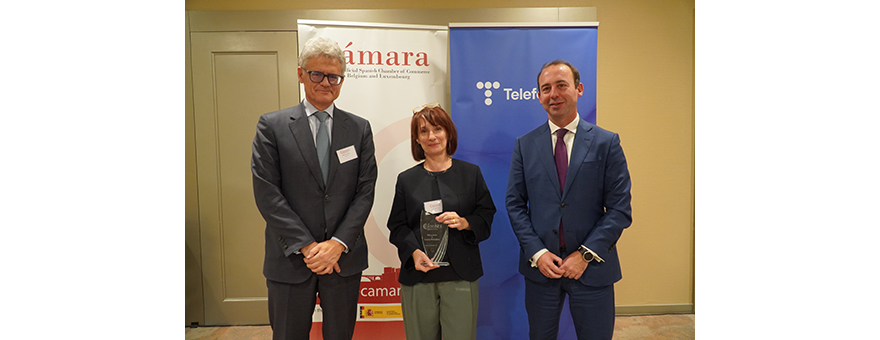Luncheon-debate held with Linsey McCallum, Deputy Director-General for Antitrust in the Directorate-General for Competition
On Wednesday October 18th, the Official Spanish Chamber of Commerce in Belgium held a new luncheon-debate in the framework of its “Business Circle” platform, in which the Deputy Director General for Antitrust at the Directorate General for Competition, Linsey McCallum, spoke on “Superdominant positions in the digital era, how competition law enforcement would tackle their consequences”.
After the welcome cocktail, the President of the Chamber, Pablo López-Álvarez, opened the lunch by introducing the topic for discussion and giving way to the Secretary General and Secretary of the Board of Telefónica (the event’s sponsor), Pablo de Carvajal González.
During his introduction, De Carvajal explained that they are “at a revolutionary moment” in digital matters, in the midst of a debate on how to regulate the super-dominant positions of the digital giants. In this regard, the Telefónica representative wanted to ask the keynote speaker about the Commission’s plans to control the abusive behaviour of large companies.
Gatekeepers
McCallum began her presentation by saying that “the societal impact of big digital companies is overwhelming”. She recalled that last September the Commission designated six digital giants as “gatekeepers” to the market: Alphabet (Google), Amazon, Apple, ByteDance (TikTok), Meta and Microsoft.
Under their new status, these six companies must comply with a number of obligations specified in the Digital Markets Act and submit a compliance report detailing the solutions they have put in place to address the market access barriers they impose through their activity on other digital companies.
She also mentioned the market investigations the Commission has launched against Microsoft and Apple to ensure that the activity of both companies has been in line with their “gatekeeper” status. “Transparency in these cases is very important,” McCallum said.
The speaker summed up the Commission’s position by stating that “the closer to a super-dominant position a company is, the stronger its obligation to ensure fair competition”.
At the end of the presentation, there was an extensive round of questions in which issues such as cooperation between the Commission and the CMA (Competition Markets Authority) to regulate competition or the relationship between the Commission and the national authorities of the Member States so as not to overlap their competences in this area were raised.


